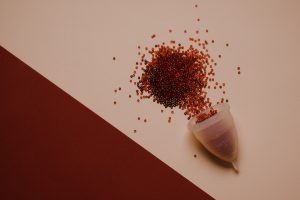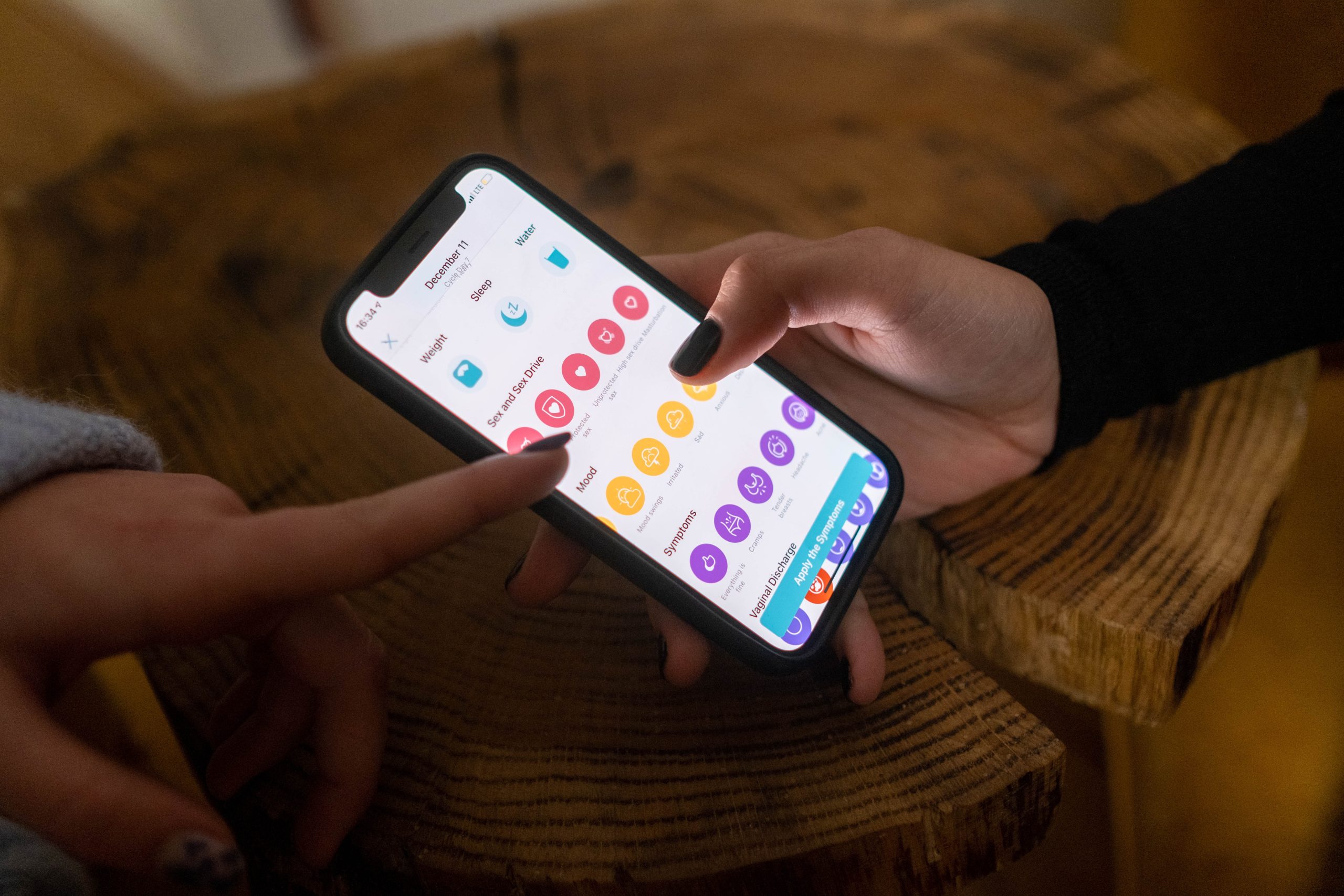What we know as ovulation bleeding is a pretty simple way of releasing an egg by your ovary. This process also goes by the name of ovulation spotting.
Today’s article is all about ovulation bleeding to comfort you and make you panic a little less.
Table of Contents
What is ovulation bleeding
I understand how scary you might feel if you’re bleeding two weeks after your period ended. It can happen to anyone the first reaction is nothing but fright.
However, the ovulation process is different for every woman. Some women do experience ovulation bleeding from time to time. But for some, the ovulation process happens without any symptoms.
Surprisingly, there are women who were unaware of this important biological process until they started trying to get pregnant. Each woman needs to know about ovulation and ovulation bleeding. Therefore they can easily spot any abnormalities during this process.
Women must have a clear idea about their menstruation cycle. At first, you should not be scared when your period is not meant for another few weeks, and suddenly you are bleeding.
The bleeding is very minimal and pinkish. You might have had this every time your ovary releases an egg, or you never have it. Generally, ovulation bleeding occurs when 11 to 21 days have passed since your last menstrual cycle.
Ovulation bleeding doesn’t mean that something unnatural is happening inside your system. Though in some cases, you might have a few underlying health issues. But most of the time, the bleeding is not alarming.
But, before letting you know more about ovulation bleeding, it’s time to address the elephant in the room.
Why talk so much about ovulation spotting when you can’t even tell the difference between this and menstruation?
So, here’s how to differentiate between a normal menstrual cycle and ovulation bleeding.

Difference between ovulation and mensuration bleeding
One of the main differences between these two is the duration. When you are on your period, your bleeding generally lasts four to seven days. But ovulation bleeding normally lasts for one or two days tops.
Also, as we all know, menstrual bleeding has a strong flow. The color is deep red, and sanitary napkins are mandatory. But when it comes to ovulation bleeding, the amount is minimal, and therefore no sanitary napkins are required.
Additionally, ovulation spotting happens fifteen to twenty days after menstruation. So, before you figure out why you are bleeding all of a sudden, make sure to remember this timing.
When you are ovulating and you are bleeding because of it, there are other things you might feel. Your breasts normally become sensitive because of the high estrogen level. You are either bloated, or a particular side of your lower abdomen might hurt.
Some women don’t bleed during ovulation. Their vaginal discharge is not red but rather clear and sticky. Other than ovulation bleeding or spotting, science defines this condition as estrogen breakthrough bleeding.
Some women have no other symptoms other than very minimal bleeding. But, in some cases, they might feel like cramps or changes in body temperature.
How long does ovulation bleeding last
Ovulation bleeding last for 24 hours to 72 hours. So, one to three days. The thing is that ovulation needs to maintain a proper schedule. It only occurs every month after eleven to twenty days of your period. The timeline could get trickier sometime.
The most significant thing to remember is that when you are ovulating, it is the ideal time to get pregnant. So, this is the best time to do the hanky-panky to make babies!

Bleeding during ovulation for the first time
Bleeding from any area of your body could scare you. But, when it is the vagina, our fears double!
We understand that bleeding during ovulation for the first time can be scary for anyone. Suppose you have never experienced vaginal bleeding outside of the menstrual cycle. Therefore, out of the blue, there is blood in your underwear.
Don’t panic or book an appointment with your doctor without understanding what happened to you. If more than ten days have passed since your last period, you have completes signs of ovulation bleeding. You are just experiencing normal ovulation bleeding.
There is a high possibility that you will experience something like this at least once in your fertility period. Then again, some don’t experience it at all.
If the bleeding is light and not severe, and your breasts are sore, you have experienced ovulation bleeding for the time ever.
If you still need clarification, we suggest you talk to your gynecologist. The doctor will confirm why you had this experience and resolve the problem if it is serious.
Hormonal fluctuations often cause such sudden bleeding. Maybe you hadn’t experienced it before, as your hormones were balanced and steady.
Bleeding during ovulation am I pregnant
After reading the first few sections of this article, you know that ovulation bleeding is normal. But does this also mean you could be pregnant?
Just because you are experiencing ovulation bleeding doesn’t necessarily mean there’s a baby popping out of in nine months. In fact, bleeding is one of the signs of miscarriages, and not otherwise.
Ovulation bleeding means that the hormone levels of your body are not steady. There are ups and downs, which is why your body is making you go through this.
An unstable hormonal flow between estrogen and progesterone can cause ovulation spotting. But some people make mistakes by confusing ovulation bleeding with implantation bleeding.
Ovulation bleeding vs implantation bleeding
Ovulation bleeding is a phenomenon that happens every month in a fertile woman’s life. This doesn’t always indicate that someone might be carrying a baby.
But, implantation bleeding could be an indication that you are pregnant. You might be bleeding just when your next period is near. So, it’s not easy to spot the difference.
Implantation bleeding doesn’t occur alone. You feel nauseous, your head hurts, or you are cramping.
Implantation bleeding is similar to ovulation spotting, light in color, and this time it could be brownish too. But exactly why does this bleeding occur?
The reason is directly related to pregnancy. When a fertile egg is linked with sperm, you conceive. After ten days of this incident, the fetus goes directly to stick with your uterus wall.
In the uterus wall, some blood vessels sometimes fail to stick through. Then the blood vessels are eliminated from your system in the form of vaginal bleeding. This particular incident is what we know as implantation bleeding.
So, you now understand that implantation bleeding generally occurs whenever you are pregnant. Not all women experience it during the early weeks of their pregnancy. But some do experience it.
Only you know exactly what your normal menstruation looks or feels like. You can easily spot the difference if you examine the blood real quick. So, don’t confuse your ovulation spotting with implantation bleeding.

What does ovulation bleeding look like
The ovulation process matters the most when you are planning to conceive. Things would be much easier if you knew exactly when you would ovulate.
As we said earlier, the problem is that none of us bleeds during ovulation. So, how do you know that you are ovulating?
There are several ways to find out whether you are ovulating or not. Now we are going to tell you about the ways.
Temperature of your body
First, keeping a base track of your body temperature could be a good way to determine the ovulation process. That’s because our body temperature is supposed to be slightly higher than normal when ovulating.
So, you can check your temperature right after you wake up from a good night’s sleep every day. This way, you will know what your normal temperature is.
Therefore, whenever you notice that at a particular time of the month, that temperature is slightly high, perhaps because the ovulation process is going on.
Vaginal discharge
Another good way to figure things out is by inspecting your vaginal discharge. Whether you bleed or not during ovulation, women experience vaginal discharge. Keep an eye on what time of material is discharging from your vagina. If the substance seems sticky and clear, then there is a good chance that it results from ovulation.
So, your next job is to have sexual intercourse during this period to have a better chance of being pregnant. Also, you could use a home ovulation test kit to be sure about your ovulation phase. These tests tell about the fluctuation of important hormonal levels.
Heavy bleeding during ovulation
Bleeding during ovulation is nothing to worry about. It is a natural process that has immense significance in a woman’s life.
But sometimes, it could be a good indication that there is wrong with your ovarian system.
Heavy bleeding during ovulation is generally a symptom that something serious might be going on. Especially when the bleeding is not stopping after a day or two. You feel like you have periods.
It would help if you went to a gynecologist as soon as this happens. This might indicate that you could have a polycystic ovarian syndrome or other health issues.
It would help if you kept an eye on whether the bleeding was too much. In that case, you might have to go to your doctor for a check-up.
When there are small cysts in your ovaries, you have no idea about it; the bleeding could be a good indication. When your period is done and dusted, and you are still bleeding badly, you should go for a check-up immediately.
Sometimes our thyroid gland secretes too much or too few hormones. This could be another reason for heavy bleeding with sudden pain.
But, mainly, it’s your high estrogen level to blame for ovulation bleeding. Since the blood is not dense or you do not need a sanitary pad, there is nothing to be worried about.
Though, it would help if you never took the matter into your hand whenever you feel something is wrong. Heavy bleeding means you need a pad or two to cope with the situation. But normal ovulation bleeding doesn’t call for using pads.
So, in that case, it means that this bleeding is not normal at all. It is not due to ovulation. Maybe there are cysts in your ovary or other health issues.
Final thoughts
Throughout the article, we discussed what exactly ovulation bleeding is and the symptoms. We also told you how you can differentiate between periods and ovulation spotting.
In rare cases, ovulation bleeding could indicate that you have just conceived. But no one can tell for sure until you take a pregnancy test.
So, if you have any doubts, don’t hesitate to visit your doctor. The gynae will run some tests to ensure you are indeed pregnant. But don’t just assume anything beforehand just because you have ovulated.

